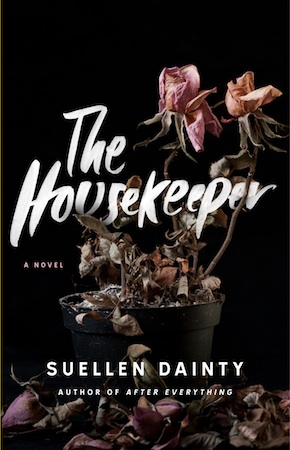A memory of memory
by Suellen Dainty
“Mesmerizing suspense.” Publishers Weekly
Memory is our own unreliable narrator. It forgets things that matter and recalls other events that never happened. It can slip away like receding mist or haunt us in a perennial nightmare.
To the extent that they track selves through time, all novels are about memory. But some are more concerned with the notion than others. The best known, and most quoted in international neuroscience research, is Marcel Proust’s seven-part novel, In Search of Lost Time (also translated as Remembrance of Things Past). In his famous ‘madeleine moment’, Proust dips a little piece of cake into his cup of lime blossom tea and writes: “No sooner had the warm liquid mixed with the crumbs touched my palate than a shiver ran through me and I stopped, intent upon the extraordinary thing that was happening to me… Whence did it come? What did it mean? How could I seize and apprehend it?… And suddenly the memory revealed itself.”
Julian Barnes’ Man Booker Prize winner The Sense of an Ending has a more ambiguous relationship with memory. In a novel obsessed with verification of unreliable memories, the biggest explosion comes from a memory that the main character, Tony, has irrefutably hidden from himself for decades. Before I Go To Sleep by S.J. Watson takes the idea of loss of memory caused by trauma and its consequences to create a thriller with chilling effect. If you have no memories, who are you? How can you know yourself if you cannot remember your past?
We say that we don’t like baked beans or Brussels sprouts because we were made to eat them as children. We like chocolate cake because it reminds us of childhood birthdays and the smell of baking. The act of eating these things transports us back to the past with every detail etched crystal clear. This is a convenient and reassuring theory of memory, plausible but not entirely accurate. Neuroscientists and novels tell us the same thing: memory is not a straight reliable line of events that we can call up at will to explain our fears and joys, our likes and dislikes. We forget that Proust himself found the matter of memory much more complicated than nibbling a piece of cake and sipping a cup of tea. “The truth I am seeking,” he writes, “lies not in the cup but in myself.”
If she cannot remember her early childhood with any accuracy, how can she know who she is? Introduce any kind of trauma and these questions become more complicated and frightening.”
This is where the main character in The Housekeeper, Anne Morgan, starts to worry. If the truth of memory lies within oneself, what happens if she can’t remember the past? Or at best, she can only remember vague disconnected images that seem to relate to nothing or no one? Anne, like most of us, believes that her mind is made up of her memories and her mind is who she is. Like Aristotle, she believes that the memory is the scribe of the soul. But if she cannot remember her early childhood with any accuracy, how can she know who she is? Introduce any kind of trauma and these questions become more complicated and frightening, particularly to an isolated and slightly obsessive personality.
Anne Morgan, born with the more lyrical name of Annastasia Swan, remembers almost nothing of her first five years. She knows that her mother died in mysterious circumstances. Occasionally, fragmented images jump into her consciousness, but there is nothing that she can nail down with any satisfaction. It does not help that her grandmother, who brings her up after the death of her mother, refuses to tell her anything on the misguided basis that the past is best left alone. “You never get anywhere digging about in the past,” she tells Anne. “No one can ever tell, so it’s best to leave it.”
Anne’s grandmother has a point of sorts and she means well. But her silence prompts questions and not just for my main character. What, for example, would we remember of our early childhood if there were no family photographs or videos to corroborate events? We remember that day on the beach when we caught a crab because the photographic evidence is right there in front of us. We have been told so many times that we hate riding because we fell off a pony at the age of four. Our memory of this is so clear that even now we can feel the jolt as we hit the ground. But would we remember falling off the pony if no one was around to tell us what had happened? And how would it affect us if there were extended periods of our life devoid of any recalled or narrated details?
Anne, renamed by her grandmother because Annastasia is “too complicated” is in this unenviable position. Through her adolescence and young adult life, and during the years that she works as a chef, she chooses not to play psychological detective games with her own past. She looks upon it as a box that she has deliberately locked and then thrown away the key. Having a decidedly odd childhood has set her apart and, like most people, she wants to be just like everyone else.
It is only when she leaves the frenetic world of a restaurant kitchen and starts her new job as a housekeeper that she has time to think and remember. But when she does start remembering fractured images, she is unsure if they are true or false, and with good reason. The only thing she knows to be true is the way these fractured images make her feel. So her emotional memories are true, but she is unsure of the facts surrounding them.
This causes her immense distress, particularly as her grandmother has recently died and her secrets are buried with her. Anne and her grandmother lived a lonely and isolated life and there are no other relatives or family friends who can tell her the truth. As Anne says: “We could have done with a few more members to liven things up; a family joker, a chubby uncle who came to dinner once a week, or a maiden aunt. And a cousin or two wouldn’t have gone amiss.”
Any cursory reading about post-traumatic stress disorder shows that trauma of any kind confuses memory. Anne is not a victim of war or atrocity, but she is undone when her lover leaves her and she loses her job so soon after the death of her grandmother. All her losses roll into one and she finds it almost unbearable.
Recollections of all kinds can be influenced and modified by facts, ideas, suggestions and information received after events.”
The emotional effects of the unreliability of memory and how these are exacerbated by trauma is one of the central and underlying themes of The Housekeeper. While researching the novel, I read about the early memories of the famous child-development psychologist Jean Piaget. Piaget believed that someone had tried to abduct him from his pram when he was being taken for a walk by his nurse. He vividly remembered every detail – the man trying to grab him, the nurse beating him off and their eventual escape. The Piaget family was wealthy, so the story made sense. But when he was about fifteen the nurse, who had left the family many years before, wrote to confess that the story was a complete lie. She had invented it in an effort to ingratiate herself with the family. After becoming a member of the Salvation Army, she wanted to make amends. She apologised and returned the valuable watch that Piaget’s parents had given her to thank her for saving their son.
I also read research by the American academic Elizabeth Loftus. Professor Loftus has made memory her life’s work and concludes that without independent corroborative evidence, no memory can be regarded as completely true. Recollections of all kinds can be influenced and modified by facts, ideas, suggestions and information received after events. She argues very convincingly that this is a controversial but incontrovertible proof.
Piaget’s story and Loftus’ research slip into any writer’s sensibility with ease. There would be very little to write about if everything about us was self-evident and unable to be changed in any way. This is not to deny the importance of facts and the need for any story to be embedded in a credible reality. But the excitement of writing and reading lies in the perennial ‘what if?’ of any situation or personality, and how characters remember and perceive events and each other in totally different ways. Writers and readers, just by the act of writing and reading, accept the elusive nature of memory and its role in the creative process.
 Suellen Dainty was a writer for the Sydney Morning Herald and The Australian and a reporter for the ABC before moving to London more than 25 years ago to work for Sky News, where she was a producer and director of the original series of The Book Show. She has studied Creative Writing at the University of Oxford and Bath Spa University and lives in London. The Housekeeper is out now in paperback from Washington Square Press, along with her previous novel After Everything. Read more.
Suellen Dainty was a writer for the Sydney Morning Herald and The Australian and a reporter for the ABC before moving to London more than 25 years ago to work for Sky News, where she was a producer and director of the original series of The Book Show. She has studied Creative Writing at the University of Oxford and Bath Spa University and lives in London. The Housekeeper is out now in paperback from Washington Square Press, along with her previous novel After Everything. Read more.
suellendainty.com
@SuellenDainty
Author portrait © Mat Smith

